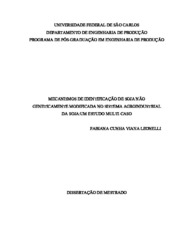Mecanismos de identificação de soja não geneticamente modificada no sistema agroindustrial da soja: um estudo multi-caso
Abstract
The present thesis investigated the role of coordination and management
supply chain in face of identifies no-GM crops and the need to preserve the identity of
grains. This change traverses the entire productive chain, from the seeds industry to the
final consumer, ever more demanding in terms of issues related to food safety. A new
arrangement in the system (Strictly Co-ordination) will be linked to the capacity of the
various agents of the agroindustrial systems to coordinate and manage these
relationships, mainly by means of the development of mechanisms of incentives and
control, including efficient forms of identity preservation (IP), traceability and
certification of the product throughout the chain. The latter will play a fundamental role
in diminishing the information asymmetry between producers and consumers and
valuated agri-food products. The theoretic framework utilized was Transaction Cost
Economics, which allowed the foundation and systematization of the analysis, validated
by case studies that involved situations of Identity Preservation in Brazil. Thus, four
firms that work with non-GM soybeans and utilized segregation systems, incentives and
monitoring of crops production were analyzed. It was verified that, indeed, the trend
toward product segregation involves the need for adaptations and alteration in the
predominating governance form. Identity preservation also involves increased costs,
which permeate all phases of the productive chain. These costs are identifiable and
have a strong relationship to the characteristics of the transactions and to the attributes
of the product one wishes to segregate. The thesis also identified that incentive and
monitoring strategies are fundamental for the success of the identity preserved (IP)
system. The other relevant aspect was about reputation of the certificated entity.
